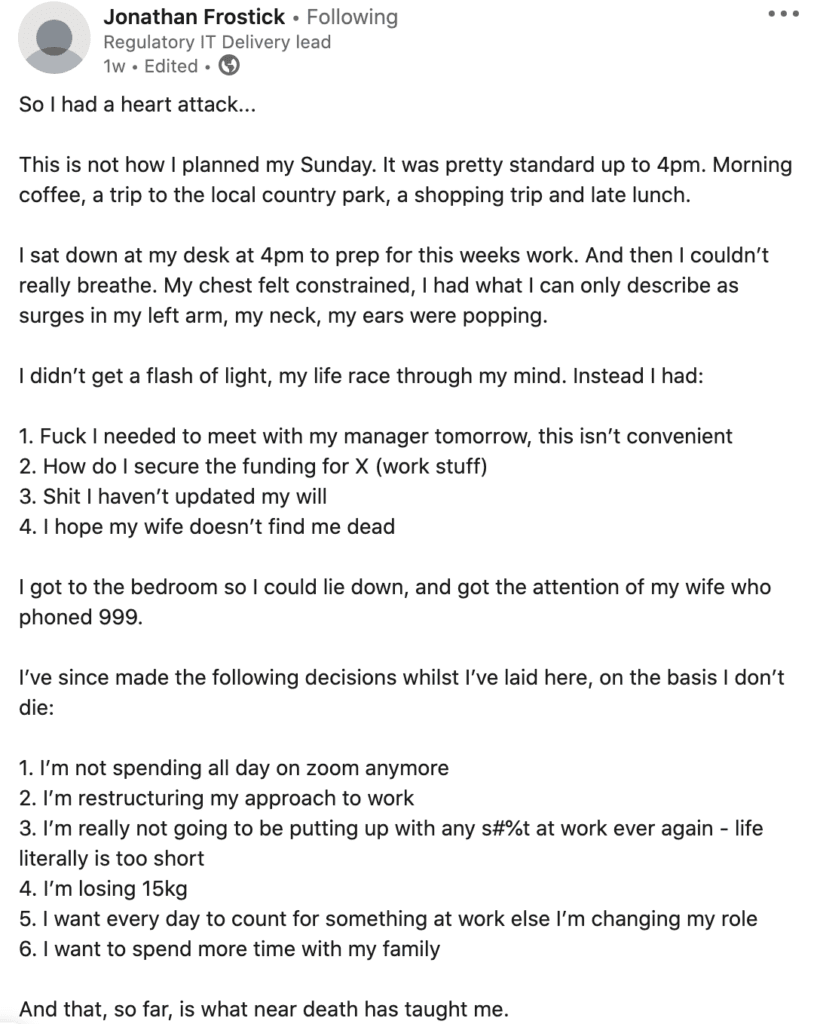Week in HR tech: Lessons from a heart attack and the ‘King of Absentees’
Vulnerability and professionalism aren’t mutually exclusive.
Why You Should Care
Burnout is real.
HR need to play a pivotal role in ensuring employees feel safe to ask for help.
Vulnerability and professionalism aren't mutually exclusive.
Hello, how are you? That’s a question a lot of employees and leaders ask several times a day, but I’m not convinced anyone really answers sincerely.
I grew up thinking that being vulnerable was a sign of weakness and that being professional meant being impersonal. Now I know vulnerability and professionalism aren’t mutually exclusive.
Earlier this week, I came across a LinkedIn post, that has gone viral. In the post, Jonathan Frostick, a bank contractor described his reaction to having a heart attack while working from home.

Frostick’s post speaks for itself. It paints a very clear picture of how work can quickly take over one’s life.
The post, which has so far received over 250,000 likes, is flooded with comments from people saying they have suffered the same fate.
“This happened to me February 07 2020. I have since done a few of the same things! It’s crazy how you realize how important the so called small things in life are. I work hard but when the day is done I take the time for myself and family. I have now realized that I do not have to keep a phone in my pocket 24 hours a day. People will leave a message if it’s important and you can call them back. Without family and health what else have you got!!!,” said one commenter.
Unfortunately, most of us are well versed with the effects of stress, and quite possibly burnout, but this particular post really struck a chord with me.
Wellbeing at work
Unrealistic performance targets, holiday refusals, lack of accountability, and low resources all contribute to employee burnout. The market is awash with employee listening tools to help employers identify key issues, yet many people continue to face these problems on a daily basis — and what’s worse, many feel they can’t speak up.
Years ago, I worked for a startup where all the aforementioned happened. Long days were not just common, they were normal. I was bullied by my boss, who also happened to be the founder and CEO. It was detrimental to my mental and physical wellbeing — I was ill almost every month during the two and a half years I worked for the company.
It was a small team. There was no HR technology — there wasn’t even an HR representative or department. I suffered in silence until things got so bad that I just left.
I’m not, for one second, comparing my experience with what Frostick has had to endure, but I do think there’s something to be said about the need for a life and work balance, as well as for people to feel they can speak up when one’s feeling overwhelmed.
I find most managers are empathetic when employees come to them for guidance or advice. More often than not, they’ll go out of their way to help. This shouldn’t be a utopia, it’s simply common sense.
Absenteeism…for 15 years
I don’t want to detract from the seriousness of the above, but I do want to lighten the mood slightly.
I’m sure you would have come across this particular story this week, but if you haven’t here’s a quick summary:
An Italian man, dubbed the ‘King of Absentees‘ has allegedly skipped work for 15 years. No, that’s not a typo.
The man, employed by a hospital in the Calabrian city of Catanzaro continued to be paid a monthly salary to total around £464,000 despite not turning up to work since 2005.
Now aged 67, the man is facing charges of abuse of office, forgery, and aggravated extortion. Six managers are also being investigated on suspicion of having played a role in enabling his alleged absenteeism, which is rife in Italy’s public sector.
If this isn’t a clear example of why employee tracking technology is needed, then I don’t know what could be.
On that note, happy Friday!
Sign up to the UNLEASH Newsletter
Get the Editor’s picks of the week delivered straight to your inbox!

Columnist
Former editor of UNLEASH, Yessi is a seasoned tech journalist and regular contributor to Times Radio in the UK.
